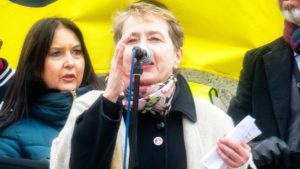
Mohsen Abdelmoumen: You wrote the very interesting book « Breaking the South Slav Dream: The Rise and Fall of Yugoslavia. » What were the real issues in the dismantling of Yugoslavia?
Kate Hudson: External intervention was primarily responsible. Yugoslavia had occupied an unusual position as a socialist country between the two cold war blocs, and the west had an interest in it remaining a ‘neutral’ country during that period, but once the Soviet Union was on the way out, the US sought to introduce a free-market economy into Yugoslavia, taking advantage of the economic crisis it had caused through the imposition of IMF policies, following earlier loans to Yugoslavia. The crisis began to spin out of control as Germany recognised secessionist republics in Slovenia and Croatia, encouraging the breakup of the unified state. Then numerous international actors began to want a piece of the pie, and conflict and war followed.
You have written another important book: « CND at 60: Britain’s Most Enduring Mass Movement ». What is the impact of the anti-war movement on Western public opinion?
The movement has had an immense impact on public opinion, including opposition to nuclear weapons, notably in the 1980s the massive struggles against the imposition of cruise and pershing missiles in western Europe. All these missiles were removed, in no small part due to popular protest. Protests against the Vietnam war were very strong which kept the UK out of major intervention in that country; and the most powerful campaign was against the war on Iraq. A majority of the population opposed that war but Blair’s government ignored the mass popular sentiment. These days, the overwhelming majority of the population supports the global abolition of nuclear weapons, but the UK government is increasing its nuclear arsenal. The government is consistently at odds with the population on questions of war and peace, and we continue to work to change that.
You are the General Secretary of the Campaign for Nuclear Disarmament (CND). Can you tell our readers about your organization? In your opinion, are we safe from a nuclear war?
CND was founded in 1958 because of huge public concern about nuclear weapons: people were very worried about the possibility of nuclear war, but also about the hundreds of nuclear weapons tests that were taking place in the atmosphere, some of which were over a thousand times more powerful than the bomb dropped on Hiroshima. The health consequences were of great concern given the scale of radiation that was being emitted. Very rapidly thousands of people signed up to CND and joined our huge marches to Aldermaston – the factory outside London where Britain’s atom bombs were built. One of our first victories was the signing of the Partial Test Ban Treaty in 1963 which outlawed atmospheric nuclear testing. Ever since then we have campaigned against nuclear weapons and war. We are rightly very concerned about nuclear weapons today. New nuclear weapons are being built – the UK is increasing its arsenal, and ‘usable’ nuclear weapons are now being deployed where previously it was said they would ‘never be used’. At the same time there is increasing militarisation and intensifying global tensions that could lead to nuclear war. This is one of the reasons why the hands of the Doomsday Clock are set at 100 seconds to midnight – the closest they have ever been, together with the other existential threat we face: the climate emergency.
Together with director Ken Loach and writer Gilbert Achcar, you launched a call in 2013 for the creation of a new left-wing party. Can you explain why?
None of Britain’s main electoral parties at that time offered an alternative to neoliberalism, let alone to capitalism. Since the 1990s, the Labour Party which had traditionally been the party of the working class, embraced neoliberal economics and when in government from 1997 failed to reverse the terrible policies of the Thatcher years, privatisation, deregulation, attacks on trade union rights. So Left Unity was founded to provide a clear anti-capitalist, left, internationalist alternative, linked to the radical left in Europe.
In your opinion, don’t we need a combative left in the face of neoliberal excesses?
Yes, we urgently need such a force. Following the financial crash in 2008, there was a radical left upsurge in Europe against the austerity policies being imposed by governments, and many new movements developed, in some cases bringing left governments to power. In Britain this radical surge boosted Left Unity but then found its primary outlet in the form of support for Jeremy Corbyn as leader of the Labour Party, and the work to change Labour policies. Unfortunately, this left turn was eventually defeated, so we are faced with the new challenge of rebuilding the left to defeat the increasingly right-wing and repressive politics of the Johnson government.
Don’t you think that capitalism has run out of steam and that it is imperative that we overcome this deadly system?
Capitalism has long since stopped taking society forward in any way and system change is long overdue. Capitalism and imperialism are not only destroying lives, livelihoods and communities globally, stoking wars, plundering other people’s lands and resources and behaving with the utmost brutality at all levels; it is now responsible for two rapidly accelerating existential threats – the climate catastrophe and the increasing possibility of nuclear war. Change is absolutely essential and urgent.
In your opinion, with imperialist wars dismantling nation states and stripping people of their wealth, don’t we need a global anti-imperialist front?
Absolutely this is what we need. The problems that we face are global problems and they must be solved on a global level. The left must avoid being stuck in a narrow national context. International solidarity and cooperation is more essential than ever.
How do you explain the lack of combativity of the trade union movement? Aren’t we undergoing a major social regression?
Speaking about this problem in Britain, there are two main factors involved. Firstly, the trade union movement here is largely linked to the Labour Party, which is at best centre-left and at worst embraces the neoliberal free market rationale. Secondly, since the 1980s and the Thatcher era, the class struggle weight of the trade unions was smashed by the anti-trade union laws and the deregulation of of that time. A number of major strikes were defeated, notably the Miners’ strike, and the trade union movement here hasn’t recovered. Not least because when Labour came to power in 1997 it didn’t reverse the Thatcherite anti-union laws. There has been some evidence recently of a grass roots upsurge in some unions, and there have been new unions founded too, but there is a long way to go.
What can you tell us about your experience in Left Unity?
Left Unity has great policies and very strong international links as part of the European Left Party, as well as good links in Latin America and elsewhere. When Jeremy Corbyn was elected as leader of the Labour Party we lost a lot of our members but that time is now over and there is a big exodus of left-wing people from the Labour Party. We prioritise working with other like-minded socialists and internationalists, as well as working within the movements in an open and democratic way. Our current focus is on grass roots campaigning in working class communities, opposing the repressive and increasingly authoritarian and corrupt policies of our government. Very important for us at the moment is defending the NHS, combatting the climate emergency – fighting for a red-green solution arguing for system change not climate change, fighting the far right, and opposing attacks on the living standards of working people. It’s a good party to be in but Britain’s electoral system – first past the post for the Westminster parliament – makes it exceptionally difficult for smaller left parties to break through electorally.
Are you optimistic about our fight against capitalism and imperialism?
I am always an optimist! Sometimes the problems seem insurmountable, but who knows what will be the last straw that breaks the camel’s back! The crucial thing is to continue to present radical left alternatives and solutions to the disasters we are facing. We know that they are the only way forward for humanity and we need, with confidence, to build the movement internationally. Our very future is at stake!
Interview realized by Mohsen Abdelmoumen
Who is Kate Hudson?
Kate Hudson is a peace activist and historian. For many years an academic, she was Head of Social and Policy Studies at London South Bank University from 2000−2010, and is author of a number of books including, on the European Left, Yugoslavia, and the history of the peace movement. Since 2001 she has been active in the Campaign for Nuclear Disarmament, elected as Chair in 2003, and appointed as General Secretary in 2010. She is also a national officer of Left Unity, a left UK party, affiliated to the European Left.




